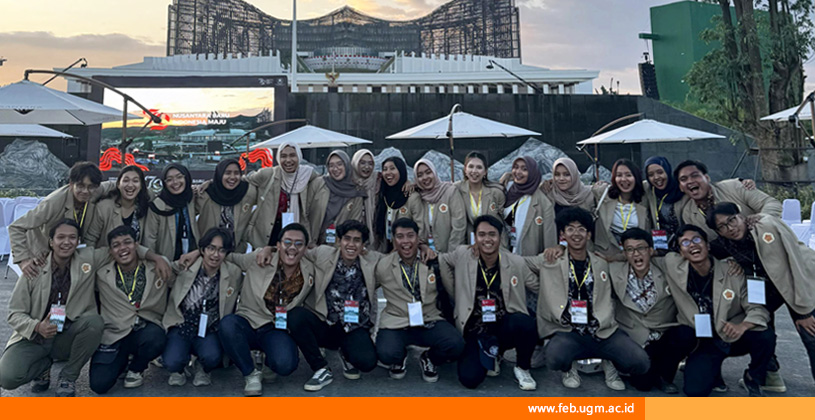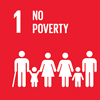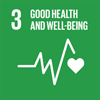Story of FEB UGM Students Participating in Community Service Across the Indonesian Archipelago
- Details
- Written by Kurnia
- Category: News
- Hits: 292

The Community Service Program (KKN) is a valuable experience for Universitas Gadjah Mada (UGM) students, including those from the Faculty of Economics and Business (FEB). During the second KKN period in 2024, which took place from July to August 2024, FEB UGM sent 379 students to contribute to community service in various regions of Indonesia.
FEB UGM is committed to developing future business and economic leaders by promoting sustainability that is in line with its mission. The students' participation in village development efforts, strengthening the local economy and improving community welfare through various KKN programs, has left a significant impact on the communities they served. Here are some stories of FEB UGM students who participated in KKN in different regions of the archipelago.
Developing Agrotourism in East Kalimantan
Bonifasius Kharisma Pascal Silalahi, a 2021 Economics student, completed his KKN in Wono Sari village, Sepaku Regency, East Kalimantan. This experience allowed him to contribute to developing village tourism, which the government had recently designated as a tourist village.
Bonifasius and his team designed the development of Wono Sari Village into an agro-tourism destination, with the Tapak Raja Cave as the main attraction. They also planned a waste bank to reduce the burning of garbage, which was an environmental problem in the village.
He recalled many memorable moments from his KKN, including the opportunity to attend the 79th Independence Day celebration in the nation's new capital (IKN).
"This is a once-in-a-lifetime experience. We witnessed the construction of IKN and how it benefits the surrounding villages. The development of IKN has brought many economic and infrastructural improvements to the surrounding villages," he explained.
Bonifasius also found it easy to adapt to the local community, as most of the population were migrants from East Java.
"Surprisingly, I found it easy to adapt here because most of the population are transmigrants from East Java, and they communicate in Javanese daily," he said.
Introducing Digital Marketing to the People of Southeast Maluku
Zaid Alfarizi, a 2021 accounting student, had a different experience during his KKN in Kei Kecil, Southeast Maluku. At first, he faced challenges adjusting to the local culture, especially since he and his sub-unit members had to live separately in local houses.
"What surprised me during KKN in Wain Baru was that we didn't stay together in a dormitory, but each of us stayed in a resident's house. I happened to have to stay in a house by myself," he explained.
But Zaid found his KKN experience on Kei Kecil Island unforgettable. In addition to the stunning natural beauty - Ngurbloat Beach has the softest sand in the world, and Pulau Bair is a mini-Raja Ampat - the people of Kei Kecil warmly welcomed UGM's KKN students.
For about 1.5 months, Zaid and his team ran several interdisciplinary programs. One was digital marketing training for local women to help them market their products online. They also organized computer training programs, product diversification initiatives, coral reef transplantation, and a cultural festival to promote tourism in Kei Kecil.
"We organized two events, Sail to Iswadi and Iswadi Festival, as the closing activities of our KKN in East Kei Kecil District," he said.
Strengthening the Marketing of Catfish Products in Riau
Genoveva Jenny Ruth, a 2021 management student, participated in KKN in the village of Koto Mesjid, Riau Province. In this village, known as Patin Catfish Village, she and her team learned about the farming and processing of catfish into various products such as smoked fish, salted fish, and catfish skin crackers.
Seeing the potential, Jenny and the UGM KKN team developed a program to promote and market the various catfish products produced by the villagers. They also worked with the local Department of Trade, Cooperatives, and SMEs to assist local SMEs with legal matters, from business license registration to product distribution permits and halal certification.
"The programs we implemented aimed to help build the business capacity of local SMEs and ensure that the processed catfish products from Koto Mesjid would be more widely recognized and accepted in larger markets," she explained.
Jenny said that through the KKN program, she was able to learn new things, grow, and share the knowledge she gained at FEB UGM with the community.
These experiences reflect the role of students in making a positive impact on the progress of communities. Through the KKN program, these young students are learning and making a tangible contribution to regional development in Indonesia.
Reportage: Kurnia Ekaptiningrum
Sustainable Development Goals









